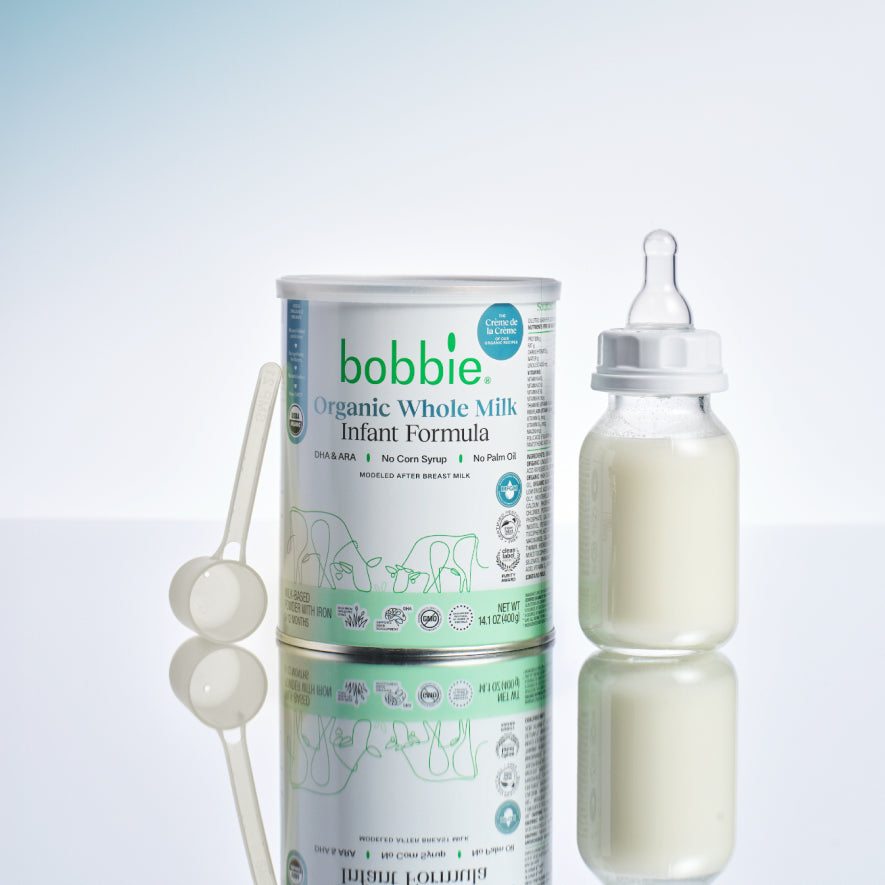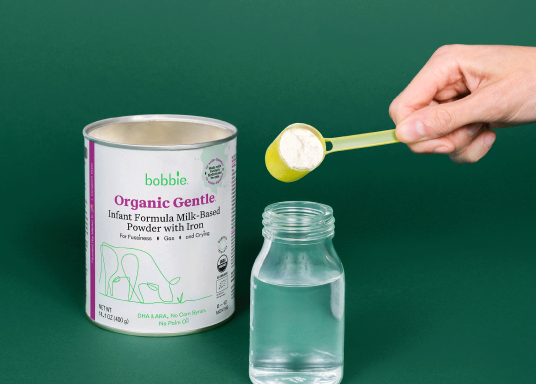Published November 13, 2025

Why an Easy-to-Digest Formula Can Make Feedings Smoother for Babies and Parents
Digestive discomfort often tops the list of worries for new parents when it comes to choosing a baby formula. After all, nothing tugs at your heartstrings faster than a fussy, gassy little one struggling to settle. That’s why formula with an easy-to-digest recipe is a great option to support your baby’s comfort, growth and overall well-being.
When a formula’s ingredients work for an infant’s still-developing digestive system, you see the difference: fewer tummy troubles, more peaceful feedings, and maybe even a few precious extra hours of sleep for everyone. We’re exploring how protein structure, iron levels and organic ingredients can make all the difference in your baby’s day-to-day comfort and in your peace of mind.
Understanding Infant Digestion: Why Comfort Matters
During a baby’s first year, their digestive system is still finding its rhythm:
-
Enzymes that break down carbohydrates and fats are still in the process of populating in the gut
-
The esophageal sphincter is looser and less mature than in older children and adults
-
Gut motility can be unpredictable, depending on factors like gut microbiome development and coordination of muscles necessary to “bear down”
Because of this, digestive symptoms like gas and fussiness are common, especially during the first 12 weeks post-birth. Even so, the nutrients and ingredients in a formula can make a difference between a calm belly and discomfort. Parents and pediatricians often notice certain signs when a baby’s tummy isn’t tolerating feeds well. Watch for these common clues of digestive discomfort:
-
Frequent fussiness or inconsolable crying after meals
-
Excessive gas, burping or bloating
-
Pulling knees toward the chest or arching the back in pain
-
Forceful spit-up beyond a mild dribble
-
Hard, pellet-like stools or, on the other end, frequently watery or frothy stools
-
Restless sleep or shortened naps due to tummy upset
Beyond the physical symptoms, tummy troubles can take an emotional toll on families. When every feeding ends in tears (yours or your baby’s), simple routines can feel overwhelming. Many parents describe the cycle of guessing, switching formulas and sleepless nights as exhausting. Not knowing how to ease your baby’s discomfort can heighten anxiety and make it harder to enjoy those early days, which is why an intentionally-designed, reliable formula can be such a relief.
Meet the first and only USDA organic infant formula manufactured in the U.S.! Bobbie Organic Whole Milk Formula offers complete nutrition for baby's first year with our closest to breastmilk recipe.
Shop Organic Whole Milk Infant Formula

The Role of Whey: Casein Ratio in Digestive Comfort
Breast milk naturally leans toward a whey-dominant protein profile (i.e., about 60% whey to 40% casein) and most of Bobbie’s formulas reflect that same ratio. Because whey proteins stay soluble—liquid—in a baby’s acidic stomach, these proteins move through the digestive tract more quickly and easily, helping feedings feel more comfortable. In contrast, formulas higher in casein form curds that sit longer in the stomach, increasing satiety but sometimes leading to discomfort. A whey-predominant formula with a 60/40 whey-to-casein ratio may help increase digestive comfort, allowing babies to feed more easily and hopefully rest more peacefully — a welcome comfort for tired parents seeking a reliable option.
How Protein Composition Impacts Infant Digestion
Whey is a fast-digesting protein packed with essential amino acids, while casein breaks down more slowly, forming curds that linger in the stomach and help with satiety. For adults, that slower release can be beneficial, but for babies, too much casein can be too tricky for their developing systems. A whey-predominant infant formula delivers steady nutrition without the heaviness that sometimes follows a casein-heavy bottle.
Bobbie’s focus on comfort goes beyond protein balance. Our formulas avoid palm oil, corn syrup, soy allergens, and other ingredients that can be tough on some tiny tummies. Instead, Bobbie uses lactose and an organic fat blend, and our Whole Milk formulas come with naturally occurring milk fat to more closely mirror breast milk’s fatty acid composition. With proteins working in harmony with organic lactose and inherent milk fat, Bobbie supports comfortable digestion for babies 0-12 months.
DHA: Supporting Brain Development and Digestive Health
DHA, or docosahexaenoic acid, is an important omega-3 that supports infant brain, eye and nervous system development.
Because the U.S. doesn’t set required DHA levels for infant formula, many formula options provide less than what experts recommend. Bobbie meets the European standard of 20 mg per 100 kcal serving — enough to help babies reach the 100 mg daily EU benchmark even on lighter feeding days.
DHA Sourcing and Safety in Bobbie’s Formula
To deliver DHA’s full benefits without triggering sensitivities, Bobbie sources it from water-extracted marine algae, avoiding fish- and egg-based sources that rank among top allergens. This plant-based source eliminates concerns about trace allergens while sidestepping the ocean contaminants sometimes found in fish oil — like mercury.
For babies with extra-sensitive tummies (or parents seeking added peace of mind), clean, allergen-free sourcing makes all the difference. By providing European-levels of DHA from a carefully vetted source, Bobbie helps build a strong foundation for comfortable digestion with brain-supporting ingredients.
Organic Ingredients and Clean Label Nutrition
Choosing organic isn’t just a lifestyle preference; it’s about reducing exposure to unnecessary contaminants during one of the most sensitive stages of development. Organic ingredients are grown without synthetic pesticides, in-organic chemical fertilizers, or harsh processing agents like hexane that can linger in food. Fewer synthetic inputs may mean lower exposure to harmful contaminants.
This is why Bobbie uses USDA Organic ingredients and goes a step further with third-party testing. The Clean Label Project Purity Award and Pesticide-Free Certification confirm Bobbie’s formulas are screened for more than 400 contaminants, including heavy metals, plasticizers, and residual pesticides. The result is a nutritional profile that’s as clean as it is nourishing — helping provide confident feeding choices for parents.
How Intentional Recipes Support Sensitive Tummies
Protein balance lays the foundation, but healthy fats complete the picture. Bobbie’s proprietary organic expeller-pressed fat blend provides essential fatty acids while avoiding palm oil, which can harden stools — thereby supporting the softer bowel movements pediatricians look for.
Equally important is what doesn’t go into the formula. Bobbie follows a strict no-list, excluding:
-
Corn syrup
-
Maltodextrin
-
Palm oil
-
Soy allergens
-
Fillers
-
Other unnecessary additives
With carefully sourced fats, internal and external purity checks, a streamlined ingredient profile and a focus on simplicity, an organic approach like Bobbie’s may help support digestive comfort.
Sign up to get the scoop on feeding, sleep, poop, and so much more. By singing up for email, you are to receive marketing emails from Bobbie and can manage your email preferences or unsubscribe at anytime

Your go-to resource for all things new baby.
Clinical Evidence and Real Parent Experiences: The Comfort Difference
Behind every can of Bobbie is a foundation of data showing that its thoughtfully balanced formula supports healthy growth while supporting comfortable digestion.
Parents see the difference every day. Based on thousands of 5-star consumer reviews, many notice quick, positive changes in their baby’s digestion after switching to Bobbie, including:
-
Softer, more regular stools that make diaper changes easier
-
Less gas and bloating, leading to calmer playtime
-
Shorter crying spells after feeds and longer, more restful sleep
-
Happier mealtimes, with eager bottle or breastfeeding sessions
-
Renewed confidence knowing their baby is thriving on clean, transparent nutrition
These results translate into real-world relief for families who have spent months searching for the right nutritional fit for their baby.
Easy To Digest Formula FAQs
Choosing the right formula for your baby can feel overwhelming, especially when digestive comfort is a top concern. These FAQs break down what makes a formula gentle on little tummies and how it can help support happier feedings, calmer days and more restful nights:
What exactly makes a formula “easy to digest” for babies?
An easy-to-digest formula is carefully designed to work with a baby’s still-developing digestive system. Key factors include a balanced protein blend (often whey-forward, like breast milk), high-quality fats and the carb source babies are designed to digest — lactose.
Can switching to an easy-to-digest formula help with fussiness?
While each baby is unique, formulas designed for gentle digestion can be a helpful part of addressing fussiness and crying.
At what age is it appropriate to start an easy-to-digest formula?
Easy-to-digest formulas (those with intact milk proteins and added whey) and are safe for newborns and can be introduced from day one if formula feeding is part of your plan. Because a baby’s digestive system is most sensitive during the first year, formulas that prioritize comfortable digestion are particularly beneficial in those early months. Pediatricians can provide guidance for individual considerations, like when it’s safe to begin using powdered formula, and whether to mix it with boiled water.
What are the signs that a baby might benefit from an easy-to-digest formula?
Look for signs like:
-
Frequent fussiness after feeds
-
Excessive gas or burping
-
Arching the back or pulling knees to the chest
-
Forceful spit-up
-
Irregular stools
Babies with shorter naps or restless sleep due to tummy discomfort may also benefit.
Are easy-to-digest formulas suitable for all babies, including those without sensitivities?
Yes! Even babies without known digestive sensitivities can benefit from a formula that’s easy on the tummy. Easier digestion can mean l more relaxed feedings, making life easier for both baby and parents. It’s always a good idea to check with your pediatrician for personalized guidance, and keep in mind that babies with diagnosed allergies will need a specialized hypoallergenic formula.
Empowering Confident Choices for Infant Comfort
Understanding the science behind protein balance, high-quality DHA and organic ingredients makes choosing a formula feel less like guesswork and more like an informed decision. Bobbie’s approach, designed after breast milk, meets most of the stringent EU nutrient standards and has been award both the Purity Award and Pesticide-Free Certifications by the Clean Label Project, offering a clear path to calmer feedings and happier days.
Confidence extends to convenience, too. Bobbie’s direct-to-consumer model includes a reliable subscription delivery service, so parents can avoid late-night formula runs or out-of-stock surprises. Every shipment provides the same rigorously tested, transparent nutrition trusted by pediatric experts and families alike.
At the heart of it, baby comfort and parental peace of mind go hand in hand. Choosing a formula purpose-built for gentle digestion helps support smoother days, restful nights and a thriving little one focused on discovery rather than discomfort.
Ready to see the difference? Shop Bobbie’s easy-to-digest infant formula today!
The content on this site is for informational purposes only and not intended to be a substitute for professional medical advice, diagnosis or treatment. Discuss any health or feeding concerns with your infant’s pediatrician. Never disregard professional medical advice or delay it based on the content on this page.











